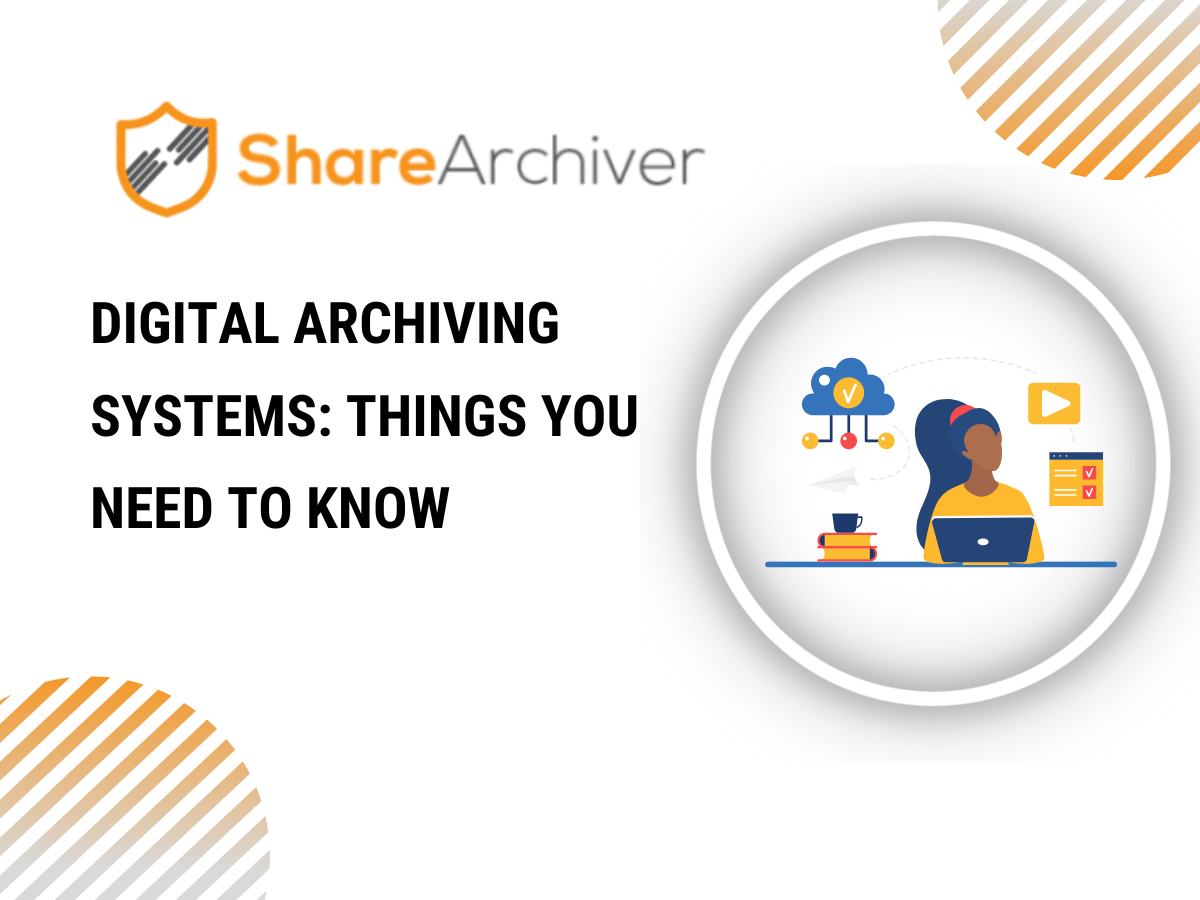Digital archiving is an integral business practice that businesses use around the world.
It helps to avoid data loss and helps you to retrieve data at any given time.
Electronic archiving also ensures your data is safely preserved and can be accessed around the clock.
Being well-versed in the importance of electronic archiving for your business is essential.
Whether it is data preservation, compliance or streamlining data processes, Digital Archiving Systems are of utmost importance.
Digital documents will be helpful in the future, such as in a marketing campaign or for legal reasons.
Choosing the right digital archiving software can have a big impact on your business with many benefits. Let’s take a closer look.
Table of Contents
ToggleWhat is Digital Archiving?

Digital or electronic archiving is the method employed for preserving digital content for future use. Your business must archive its digital content to prevent any data loss.
Digital archives store and save high volumes of data from customers and companies. Whether bills, statements, document videos, or pictures, you can archive all types of data.
Data archiving requires storage for many reasons, such as customer self-service, records management, reprints, and legal compliance.
Many industires, including financial companies, need audit proof archiving as one of the many legal requirements they have to adhere to.
Over the years, digital archiving has become popular among many businesses. In 2022 alone, the archiving market was worth 7.20 billion U.S. dollars.
In the future, digital archiving systems are predicted to grow further due to the increasing data requirements of businesses.
Why is Digital Archiving Important?
As the use of digital content has increased over the years, capturing and storing digital has become crucial.
Now, more than ever, companies are facing huge volumes of data. Therefore, digital archiving is now more critical than ever.
Digital archiving is crucial as it ensures your business can be recovered in unprecedented events.
It further ensures your data is compliant with industry regulations and standards.
Digital archiving systems and data management practices brought 42 billion U.S. dollars in 2021 alone.
In the present era, many risks are concerned with data. If you do not archive your data, you may not be able to recover your data in case of a breach.
Cyberattackers and hackers are always on the lookout for data breaches.
The data can be lost or deleted from the device at any given time. It could be a technical fault or your data could be breached by a cybercriminal.
This is why you must prepare data archives to ensure a reliable backup incase of data loss.
Benefits of Digital Archiving
- Increased Efficiency
- Better Access and Retrieval
- Cost Savings
- Reduces Risk of Data Loss
Along with preventing data loss and data analysis, digital archiving offers your business myriad benefits. Let us examine the significant benefits of digital archiving:
1. Increased Efficiency
One of the real archiving benefits of digital archiving is the ability to augment operational efficiency.
Whether paper records, filing, or retrieving records, digital archiving helps increase your workflow’s efficiency.
Digital archiving can assist your business in becoming more efficient by automating tasks.
With digital archiving systems, you can search for documents manually.
Digital archives are important if you need to search for documents that may not be present in your office.
This helps you to improve efficiency and also your workflow productivity.
2. Better Access and Retrieval
Digital archiving can provide you access to your records anywhere and anytime.
It is a prominent advantage for businesses that share records with customers and employees.
Regardless of your geographic area, you can access your data.
With digital archiving, you can access important documents at all times.
Whether you need documents related to production, deliveries, quality insurance, compliance or any other document, you can access them through digital archiving solutions.
If your paper documents are lost, they can possibly never be retrieved.
However, when you archive your documents digitally, you can easily retrieve them without worrying about losing your data.
Also, digital archives have a large storage, so you can easily maintain all your files without deleting them.
3. Cost Savings
One of the most desired benefits of the top digital archiving benefits is reduced costs.
Digital archiving systems are cost-effective solutions as they decrease the need for storage space.
Moreover, it reduces costs that are linked with managing paper records.
The primary way of cost saving is through not having print documents.
It is pretty expensive to print copies, mainly when printed in color. Moreover, you will save costs on inventory and stationery.
Digital archiving systems further help to save inventory and stationary costs.
If your business has multiple locations, digital archival will help you to save costs on sending data files to other locations.
The digital archiving process simplifies the data storage process, and digital storage is a cost-effective solution for your business.
4. Reduces Risk of Data Loss
When managing the data of your business, keeping your data safe and secure could be a considerable challenge.
Although you may use an on-site server, it does not fully protect your data. It can be hard to prevent unauthorized access to paper documents.
It is essential to note that no business is ever safe from cyber attacks or data breaches.
If your data is breached, your business may cease to continue its business operations.
Although the chance of online theft can not be eradicated, you can decrease the chances of data loss with the help of digital archiving systems.
When your business data is archived, you can limit access to only the trusted people in your circle.
You can authorize and permit who can view, edit and delete information.
Digital archiving systems store the data in centrally managed storage.
This decreases the risk of losing data and makes it difficult for others to access critical information.
Different Types of Archives
- Personal Archives
- Corporate Archives
- Governmental Archives
There are several ways to archive your data. Let us examine different data types and how each benefits your business.
1. Personal Archives
Personal archives are used to store your files.
These archives concern all the digital content created in your daily lives.
Examples of personal archives include word documents, music, websites and social media interactions.
You can store your documents, videos, photos and videos that will be valuable to your friends and families in the future.
2. Corporate Archives
Your company can use these archives to store corporate information.
The documents to be archived could include financial statements, policy documents, company records, etc.
Corporate archives assist in preserving and managing the records of that business.
These archives help to serve the needs of your employees regarding business data.
Their public access can vary since corporations may have different rules and regulations concerning public access.
Some of the prominent archives include Kraft Foods Archives and Ford Motor Company Archives.
3. Governmental Archives
The government uses governmental archives to store a country’s information.
For instance, government archives could include historical records and information about laws.
The government archives help to collect materials or data that may concern state, local or national government entities.
The example of government archives could be the City of Boston Archives
How To Choose The Right Digital Archiving System?
In the current era of technology, there is an evident need for data preservation and compliance.
With overwhelming options of Digital Archiving Systems, how do you know which suits you the best?
Let us examine some factors that can assist you in opting the right archiving system.
- Volume Preservation
- Supported Platforms
- Indexing Functionality
- Data Backup
- Compliance With Regulations
- Enterprise Content Management (ECM) Integration
1. Volume Preservation
The first thing to consider is the volume that your digital archiving system can preserve. For instance, volume preservation may be fine if you have a few documents.
However, if you have thousands of documents, you might need a scalable digital archiving system to preserve several documents.
At the corporate level, digital archives should support a large volume of data to ensure the best customer experience.
For instance, if your organization has hundreds or thousands of customers requesting to view a bill or any other document, you would want to have a digital archiving system that meets your needs.
The best digital archiving systems have efficient and robust storage.
This is since some businesses may possibly want to retrieve several years old documents.
Examples of such documents could be pension or mortgage documents.
2. Supported Platforms
It is essential to consider which platforms your Digital Archiving Systems support.
Some of the common operating systems include Windows, Linux, Macintosh and Unix.
The best digital archiving system will support several operating systems. Moreover, they would support multiple databases such as SQL servers and PostgreSQL.
The web services interface is essential for easily integrating digital archiving software.
3. Indexing Functionality
One of the elements to consider is whether your digital archiving system has the right indexing and search functionality. The digital archiving system should allow users to search the archived documents.
4. Data Backup
For any archiving system, errors or malfunctions can happen. For instance, viruses, cyberattacks or data breaches can occur at any time.
To prepare for these unprecedented events, you should ensure that the digital archiving system supports data backup.
For data backups, you can use data archives that help to preserve data for long term purposes.
Data archives are known to do more than create a copy of data.
They provide increased accessibility and assist in reusing your data in the future.
It is a good practice to leave your data in a digital archiving system that supports long-term backup.
It can help store your sensitive data and reduce the chances of data loss, deletion, and additional costs associated with recovering the data.
5. Compliance With Regulations
Usually, compliance concerns two aspects. The first is that information or data must be set in time, and the other is that storage media should be unchangeable.
The right digital archiving system would comply with standard regulations such as ISO 1464-1 and NFZ 42-020.
One of the legal regulations’ main concerns is maintaining digital safety.
Other regulations include PCI and GDPR. The GDPR allows you to remove individual customer data with their consent.
Also, a record of the data released is safely kept.
Apart from these, there may be additional regulations that a digital archiving system must comply with in different countries.
Therefore, when choosing any digital archiving system, you should ensure it complies with the regulations across other countries.
6. Enterprise Content Management (ECM) Integration
ECM is another factor that can help you to choose the right archiving system.
ECM helps manage data, digital documents and other content that needs to be archived.
It is beneficial when dealing with large volumes of documents that must be archived.
Usually, digital archiving systems store large volumes of data that your business may send to your clients or customers.
Often, this data requires considerable storage for archiving records, customer data, policy documents, bills and other documents.
Preserve Digital Archives
- Metadata
- Storage Media
- Digital Content
It could be challenging to preserve digital format archives. Although there are many ways, we will examine three main types of preservation:
1. Metadata
The first type is the preservation of metadata. Metadata refers to data that describes or provides information about other data.
The examples of metadata include type, size, file name and date of creation.
The preservation deals with when there is a digital copy and metadata used to preserve and retain your digital archive.
2. Storage Media
The second type is the preservation of storage media and storage systems.
Storage media or storage medium is any device that helps to save the electronic data.
Examples of storage media include SSD and USB flash drive. Any hard copy in good condition can preserve the original media.
3. Digital Content
Finally, the third type is the preservation of content.
In simple words, digital content is all the content that may exist in the form of digital data.
This preservation deals with when you have a digital copy to preserve and secure your archive.
The Bottom Line
Data is the new norm. It is crucial to comprehend that data is merely an asset; it’s an extensive and much needed resource.
With proper management and archiving of data, it can be easier to run the daily operations of your business.
Not only does data archiving help manage large volumes of data, but it is also essential for retrieval strategy.
ShareArchiver is a file-archiving solution that delivers seamless data storage management, protection, and E-Discovery.
Reach out to us now to get the best digital archiving solutions with ShareArchive that help to streamline your data.
















